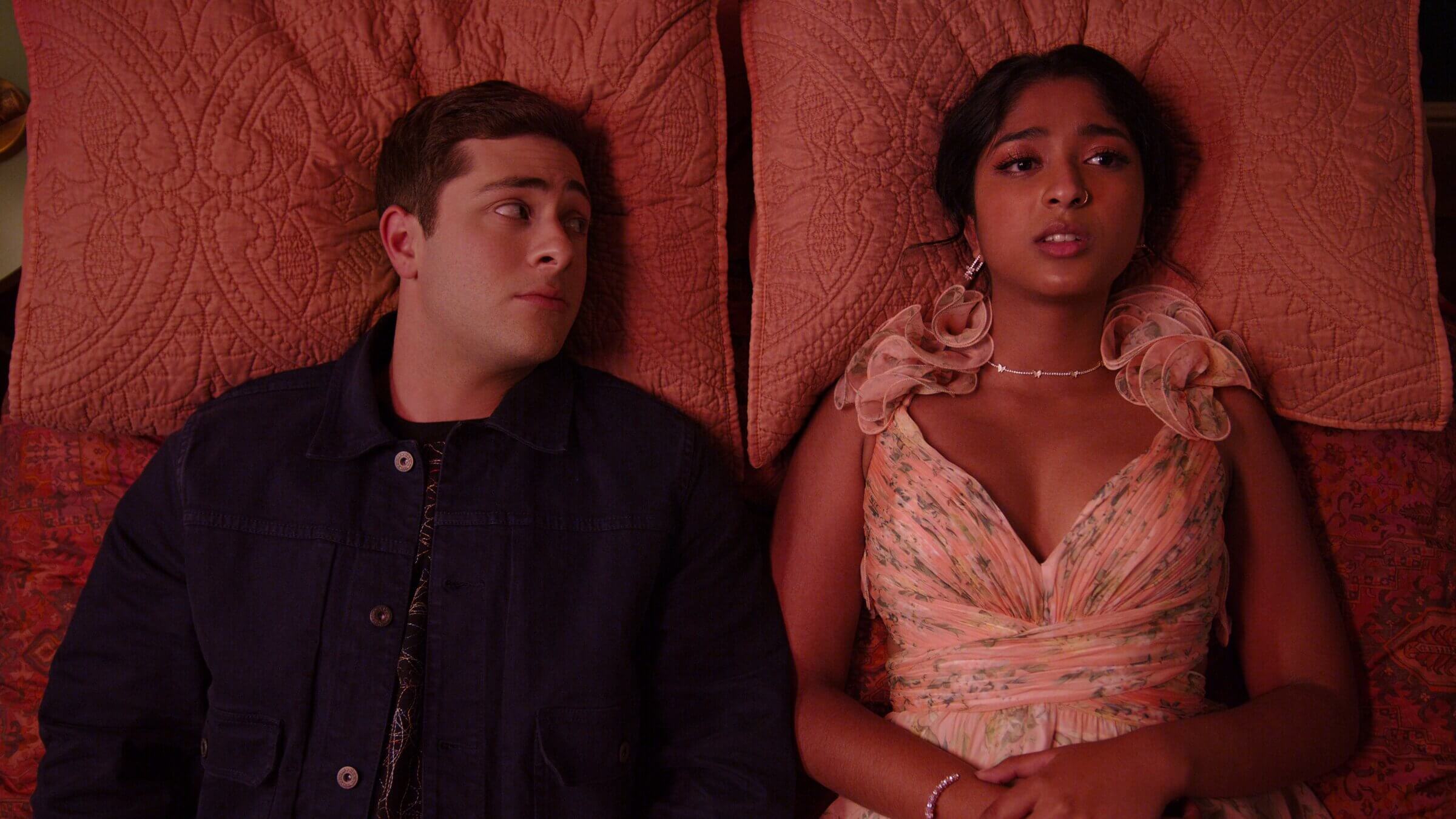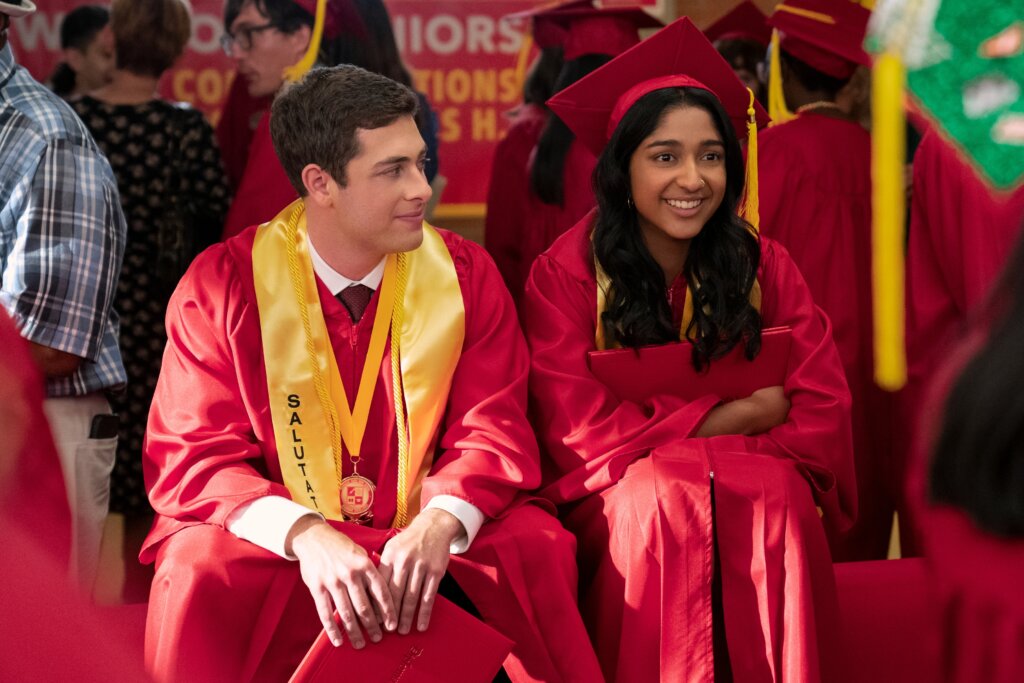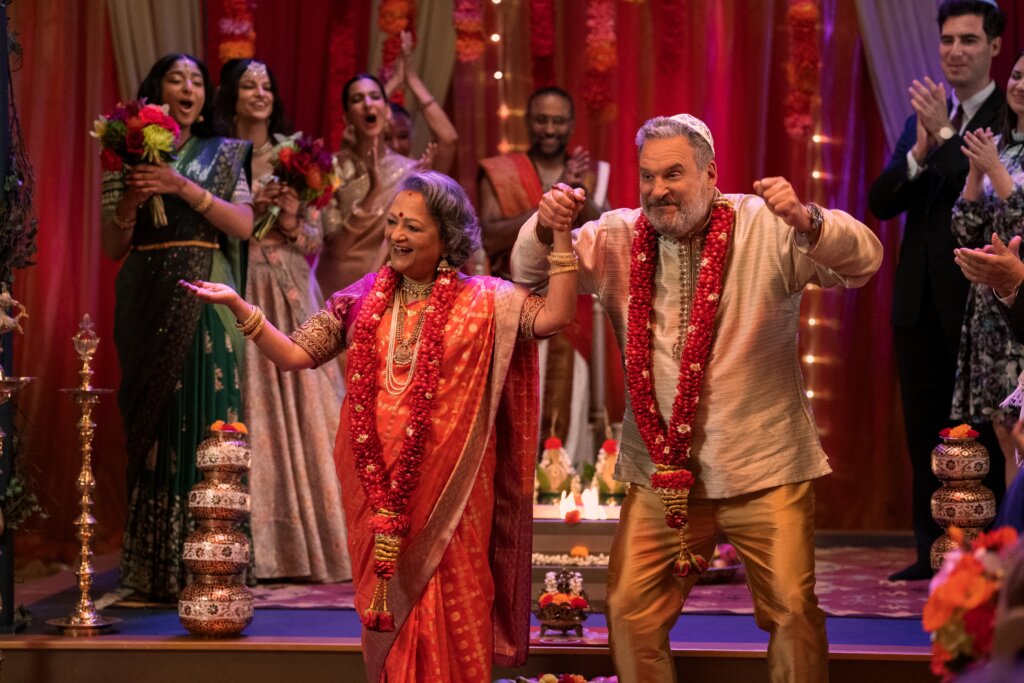Did Netflix’s ‘Never Have I Ever’ ever get its one Jewish character right?
In season one, Ben Gross was an amalgamation of Jewish stereotypes. By the final season, things got more nuanced

Ben and Devi on one of their many enemies-to-lovers arcs. Photo by Netflix
One of my first pieces in the Forward was about the hit high school comedy Never Have I Ever — specifically its Jewish character, Ben Gross. The Netflix show from Mindy Kaling was hailed for its diversity, and for breaking racial and ethnic stereotypes, but Ben was an exception. A nerdy and neurotic Jewish teen, Ben was defined by his dad, a rich Hollywood exec, and his girlfriend, a stereotypical Jewish American Princess named Shira whom he was dating for the “social clout.”
Netflix just released the fourth and final season of Never Have I Ever, and I thought it was time to check back in on Ben, and see if the show’s take on Jewish identity evolved.

Never Have I Ever follows Devi, a high-achieving and sex-obsessed Indian teen, played by Maitreyi Ramakrishnan. (Devi is a clear stand-in for Kaling.) By the fourth season, the characters are seniors in high school, and confronting the stress that comes with college applications. Devi has long dreamed of going to Princeton. Ben is planning on Columbia — New York is the land of the Jews, after all — and spends a lot of time teasing Devi about how awful New Jersey is in comparison with the veritable buffet of culture and coolness that is New York City. (Fair.)
The Columbia and New York obsession make it clear that Ben has kept many Jewish stereotypes over the course of the show. But a big thing has changed: Those traits are no longer identified as Jewish. And while that might not sound like a good thing, I think it’s actually a far more realistic portrait.
Ben is, as far as we can tell, a pretty secular Jew, who doesn’t seem to have much intentional engagement with Jewish identity. He goes to a public high school, not a Jewish day school, and though we know he had a bar mitzvah, he doesn’t seem to go to synagogue and never mentions Jewish holidays.
That’s how plenty of American Jewish teens grow up. It’s possible that with rising discourse around antisemitism, some teens are more aware of their Jewishness today, but many Jews have assimilated into the normal fabric of the U.S. That doesn’t mean that they don’t still have plenty of Jewish cultural traits, whether they experience them as something overtly Jewish or not, but their Jewishness probably doesn’t play a big role in their high school experience, at least not somewhere like LA.
Ben is fundamentally a nerdy, uncool kid. Is that because he’s Jewish? Well, sure, Jewish families can place a high emphasis on academic achievement, or pass down anxiety. And we could say these are all bad Jewish stereotypes. But many non-Jewish families put similar pressures on their kids. It’s hard to piece out what is and isn’t Jewish about Ben.
And that’s sort of the definition of the state of American Jewry — part assimilated and part not, with hard-to-distinguish boundaries. Plenty of Jews might be a little neurotic or bookish, but is that because they’re Jewish? Is it because their parents passed down those traits as Jewish values, or just because a lot of parents put pressure on their kids to do well in school?
My problem with season one of Never Have I Ever was that Ben was basically shouting constantly that he was Jewish. We knew he was wealthy because he was incessantly bragging about his expensive bar mitzvah. We knew he was a social climber because of Shira. Every negative thing about him was overtly Jewish. And while other characters’ issues with their ethnic stereotypes felt real, because their cultures were actual presences in their lives, Ben’s didn’t. He wasn’t struggling to align his Jewishness with the rest of his life, he was just a normal kid trying to navigate high school. Only all his missteps were labeled Jewish.
But over time, Never Have I Ever let Ben just be. He has plotlines that have nothing to do with his bar mitzvah or his dad’s Hollywood connections. He dates non-Jews and develops an artistic hobby. There are still moments in the show that could feel like Jewish stereotypes, but they’re no longer labeled as such. They’re just normal teen problems.
At one point, school stress gives Ben a nervous breakdown, which, in true Jewish fashion, causes such bad stomach issues that he ends up in the emergency room. While anxiety (and indigestion) may be stereotypically Jewish, that plotline isn’t peppered with references about Ben’s family’s history with therapy or IBS. Instead, the episode is about his real terror about college admissions. Similarly, Ben is excited for Columbia because he thinks he’ll find “his people” there. That’s not because New York is so Jewish, but just because he felt out of place as a nerdy kid in high school. Maybe Ben also has an intuition that he’ll feel at home there because the city is so culturally Jewish. Or not. Or it’s a mix. He probably doesn’t really know — and more importantly, the show doesn’t tell us.

Perhaps the best indication that the show’s take on Jewishness has improved is the final episode’s Jewish-Indian wedding. (My brother’s wedding was very similar.) Devi’s grandmother’s new husband, in an embroidered kippah and Indian kurta, stomps on the glass and everyone shouts “mazel tov!” I didn’t even realize he was Jewish until that moment. How’s that for progress?
Sure, it still feels a little pointed that everyone says “Ben Gross?” incredulously when Devi has a crush on him. The fact that his rich dad pulls strings to ensure his son’s success isn’t great either.
But for the most part, Ben gets to be just another teen — sometimes an awkward idiot, sometimes a sweet and insightful guy. His Jewishness is there, especially when Devi yells about his “circumcised dick,” but it’s not what defines him. (Besides, most American men are circumcised — that, too, isn’t solely Jewish.) In fact, Ben’s Jewishness has very little to do with his life at high school. He has bigger things to worry about, like who he’s dating. And that’s real representation.

















